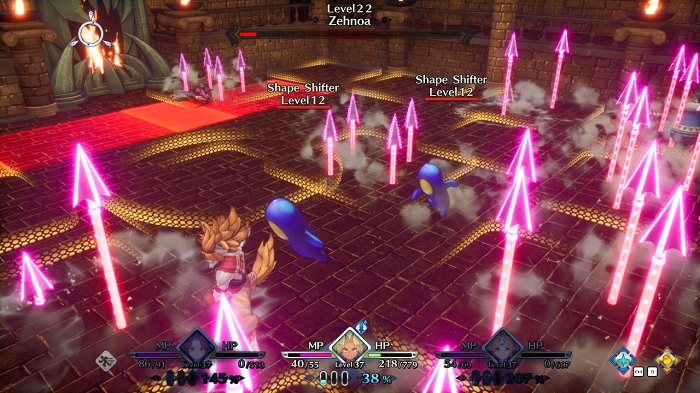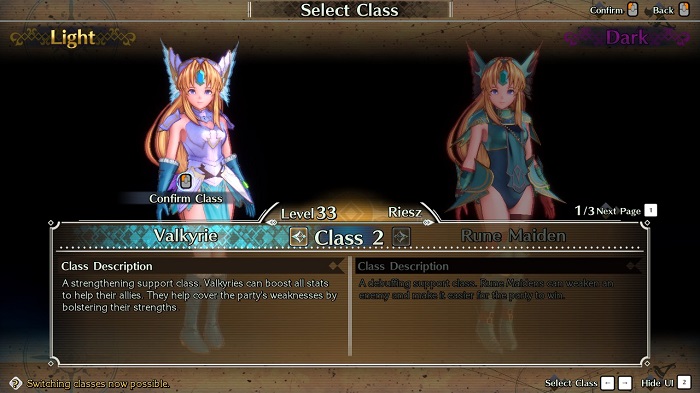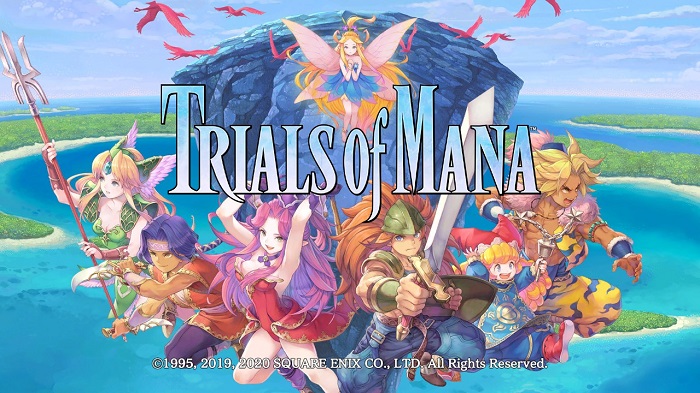Subjective:
Square Enix, acting as both developer and publisher, present the action RPG Trials of Mana (shortened to Trials for the remainder of this piece). Trials aims to reintroduce the once inaccessible Seiken Densetsu 3, better known as Secret of Mana 3, to an audience that did not have access to emulation in the late ’90s. This remake shifts the sprites to bright 3D models, the measured combat to quick battles with baddies, and adds voice acting to bring a bit more personality to each of the potential six leads.
Objective:
Trials opens by allowing the player to select a main and two supporting characters. The primary storyline is driven by the main character, with additional dialogue and character interactions provided by the supporting choices. Square Enix encourages replay by branching into three different plot arcs that cover the sides warring for the Sword of Mana. There is a lot of customization available as the player allocates bonus stat points to one of six attributes which unlocks different skills and passive benefits. Further customization is available by allowing each character to evolve to an advanced class three times, with a dark or light path each time, and an option to reset if the player wants to try new class combinations. Battles begin by approaching a group of enemies, at which point the player may hack and slash their way to victory or flee the fight.

Assessment:
Square Enix offered two flavors of remake in 2020. For the adventurous they offered Final Fantasy 7: Remake, which updated the turn-based combat and story to question what value we pull from the past. Trials is the meat and potatoes remake, keeping the same solid combat core of the original Seiken Densetsu 3 while adding bits of personality to bring the lost Super Famicom ARPG back to life. There is certainly a place in my heart and mind for something that questions the value of nostalgia but no game has had me coming back for more joyful hits of combat than Trials.
The simplicity of Trials, at least at first blush, is its greatest strength. Each of the main characters has strong motivations to go on the quest for the Sword of Mana. These range from the potentially tragic, such as Riesz with her fallen kingdom and missing brother, to the awesomely straightforward, like meathead Duran’s simpleminded desire to get stronger (that he gets stronger to also save his kingdom is an afterthought to powering up). The voice acting is not as uniformly excellent as the motivations, with Riesz sounding whisper bored most of the time and Hawkeye pulled straight from the cocky hero template. The highs include Angela’s pitch-perfect incredulous princess and Kevin’s perpetually perplexed pure-hearted Beastman. Charlotte’s voice acting, pulled from the helium-fueled hell of the worst children’s television, will buy a love-it-or-leave-it experience as the performance suits her perfectly.

The environments and character designs are much less of a mixed bag. I love that even the most darkened environments, like the forever night of the Kingdom of Beastmen, have an indigo glow to the surroundings to enhance the landscape’s visibility. The dusty or desert areas have a sun-drenched glow, forests are the healthiest of vibrant green, and stone buildings a grey poised to stand the test of time. This vibrancy extends to the characters, who also pop no matter their surroundings, and each step of their class evolution – be it dark or light – is enough of a change that the core character remains while the rest provides a fresh look on the crew I played with.
Combat is also satisfying with teensy bits of complexity to keep each fight interesting. Trials takes many cues from MMORPGs with target markers and timers for large attacks, different ways to interrupt or stifle the damage they’re capable of, and an escalating toolset to fight back with. Class choices aren’t just points of aesthetic divergence, with many of my choices taking characters from group wrecking area of effect abilities to single-target poisons.
The only problem with the variety is that it’s easy for a first time player to chance into a more complicated class setup that does work on paper, but requires more knowledge of the different buffs, timers, and weaknesses as the team may lack healing abilities. Items will only go so far, and this is the rare game where I do recommend looking up a class guide in advance to avoid locking yourself into a much more difficult situation than anticipated.

This might not be as much of a drawback thanks to the ability to switch difficulty during each playthrough. The only exception is the highest difficulty, only available after beating the game once, and highlights the disappointment in those higher options. There’s no big change in mechanics or in understanding abilities to make the journey easier. All the change does is alter how much enemies hit the party, and the amount of damage those same enemies can take. All this does is unnecessarily elongate the simpler boss fights while turning the busier sections into effective one-hit kill arenas of frustration. I did get better at gauging stun times and how long I could be invincible after dodging, but that did not lead to a more satisfying playthrough.
Still, the earlier difficulties do scale well enough that it enhances the already strong replayability of Trials. Each combination provides their own drawbacks and strengths which, along with the branching storyline, leads to a different enough experience to make it worth going on the journey repeatedly.
Trials of Mana was reviewed using a reviewer-purchased copy of the game on PC through Steam.
The Review
Trials of Mana
Most importantly, and why Trials of Mana has been of great comfort to me in 2020, is the way the main characters approach the primary conflict. Each pair that shares an antagonist has every reason to hate one another, be it from one party member's kingdom slaughtering the other or denying aid when needed most. But these characters are willing to look beyond what they're told, find their own reason to fight, and recognize that those in power hide motivations that don't serve the needs of many. Trials ultimately tells the story of how potential enemies can make for strong comrades if they just look beyond the political smoke and mirrors into what the common people of other lands are going through. It's a simple, and effective, bit of morality bolstered by a system worth revisiting multiple times.
PROS
- Vibrant graphics and character designs pop wonderfully without becoming a garish mess or losing their distinctive identities.
- A seemingly shallow combat system yields escalating depth that rewards finding new approaches to similar fights.
- Multiple class selections, branching storyline tree, and plethora of options to carry over between each playthrough encourages many a satisfying 2nd or 3rd time through the game.
CONS
- Some weak voice acting for the main characters.
- Higher difficulties create damage sponges, not more involved encounters.



